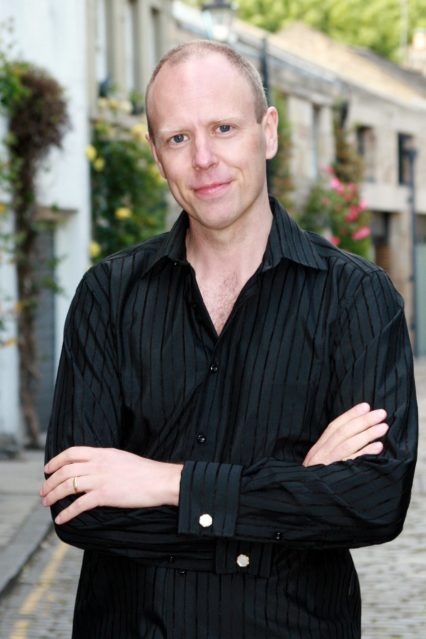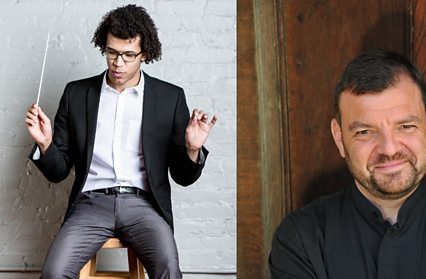Nigel Jarrett attended the BBC Hoddinott Hall for a special BBC NOW Easter concert along with two guest conductors: Jonathon Heyward and Steven Devine.
Vaughan Williams leaves his soloist stranded, possibly in a state of mute metaphysical transport, before the end of the Five Mystical Songs. On record or in broadcast, the disappearance of the baritone is total as the choir, which has chivvied him on his journey until the end of the fourth number, takes over with its stirring rendition in the fifth and final, having itself returned to more solid ground on which to sing praise. In concert, the poor chap has to stand there, robbed of music before his time, while the choir and orchestra get on with it. In a penguin suit, looking transported is not the easiest of roles.
Something of the same coming-and-going is seen and heard in J.S.Bach’s Easter Oratorio, in which the equally distributed, stand-and-deliver arias for alto, tenor and soprano are combined with almost ad hoc permutations for them as storytellers. Moreover, the choral input at the start has to wait until the very end to resume and conclude. In live performance the choir sits it out behind the orchestra like spectres come to judge. It all seems odd for a liturgical feast day, though in both pieces the choral tailpieces are mightily sounded, as celebration and communion shift from personal to collective.
The controversy surrounding the Bach work – briefly, caused by the musical and textual re-shaping of a cantata – does not much concern the musicians at a concert like this, though the imperfections do have a bearing on the need for everyone to wring the utmost from the depiction of what must have been a shocking event: the crucified Christ risen, no less, to live again. What the Easter Oratorio has always lacked is slightly greater length, more complexity, and deeper mystery; and a banishing of the inclination to compare it with those of the composer’s larger-scale religious works that have them. Directed here from the keyboard by Steven Devine, standing in for the indisposed Jonathan Cohen, it was evenly despatched, with some lovely solo work from members of the BBC NOW’s reduced orchestra and singing from Anna Dennis, William Towers, Nick Pritchard, and William Dazeley that made the right connections even if it was here and there under-projected – more the fault of Bach and his librettist than anyone delegated to despatch.
But there are dynamics to be explored, from the hurrying to the tomb (chorus), through confusion and joy (alto, tenor, bass), to full rejoicing (bass and chorus), and these could have done with a bit more sharpness and intensity – except for the thanksgiving of course, never much of a problem in this work for choristers who’ve been sitting it out. It was a nice coincidence that the loveliest aria, Saget, saget mir geschwinde/Saget, wo ich Jesum finde (Tell me, tell me quickly,/Tell me where I might find Jesus), discovered in William Towers a counter-tenor to match its outburst of temporarily stowed affection.
Bach performances these days do not defer so much to the fashion for authentic sounds; but the often smaller scale and clearer weave associated with it are ignored by the ‘non-authentic’ symphony concert at its peril. Balance and transparency are all. Those patient choral ranks were just about right numerically for the number of instrumentalists and for the need to keep rhythms flexible and soloists prominent.

In the Vaughan Williams work (settings of the poet George Herbert), William Dazeley captured that frisson between the mystical and the voluptuous that appears elsewhere in the composer’s output. Here, RVW was encouraged by Herbert’s own musical references. Inhabiting the space between heaven and earth prompted the soloist to adopt a style that enjoined the ecstatic with, for want of a better word, the operatic. He did well, and so did the chorus, knowing that before their thunderous antiphon there were more subtle coaxings and accompaniments to essay. This excellent choir does full-on stertorian and wafting nuance (such as the vocalese in the second verse of I Got Me Flowers) equally well. The support of the woodwind and harp in this same song was a measure of the orchestra’s empathy, under the direction of the concert’s other conductor, Jonathon Heyward.
J.S. Bach sports quirky dress in Percy Grainger’s Blithe Bells, an orchestration of Sheep May Safely Graze that references the bells attached to the necks of sheep in Biblical lands and spotlights tuned percussion. An orchestra has to believe in the eccentricity to make it work, for the innocence of the original becomes carried away in romantic swirls, Grainger’s tongue-in-cheek intent. Heyward made no attempt to interpret this – it’s beyond exposition – instead allowing the musicians to despatch and see what the listener made of it. He was at his interpretative best in Rimsky-Korsakov’s Russian Easter Festival overture, a work inclined to tell a story involving recognisable motifs associated with both festivity and liturgy. He dug down to a deep Slavic core and encouraged the musicians to indulge in Rimsky-Korsakov the great orchestrator. Their performance was glittering, churchly, metallic, and with a scope of geographical breadth and spiritual depth.
Rimsky-Korsakov: Russian Easter Festival Overture
Percy Grainger: Blithe Bells
Vaughan Williams: Five Mystical Songs
J.S.Bach: Easter Oratorio
Easter Concert
Anna Dennis, soprano
William Towers, alto
Nick Pritchard, tenor
William Dazeley, baritone
Easter Concert
BBC National Orchestra and Chorus of Wales
Conductors: Jonathon Heyward, Steven Devine
Easter Concert
Hoddinott Hall, Wales Millennium Centre, Cardiff, April 18, 2019
Nigel Jarrett is a former newspaperman and a double prizewinner: the Rhys Davies Award for short fiction and, in 2016, the inaugural Templar Shorts award. His first story collection, Funderland, published by Parthian, was widely praised. His debut poetry collection, Miners At The Quarry Pool, was described by Agenda poetry magazine as ‘a virtuoso performance’. Jarrett’s first novel, Slowly Burning was published in 2016, as was his second story collection, Who Killed Emil Kreisler? Jarrett also writes for Jazz Journal, Acumen poetry magazine, and several others. His poetry, fiction, and essays appear widely. He lives in Monmouthshire.



 Enjoyed this article? Support our writers directly by buying them a coffee and clicking this link.
Enjoyed this article? Support our writers directly by buying them a coffee and clicking this link.







